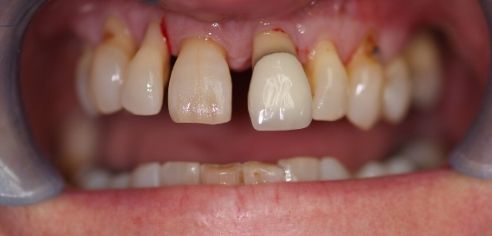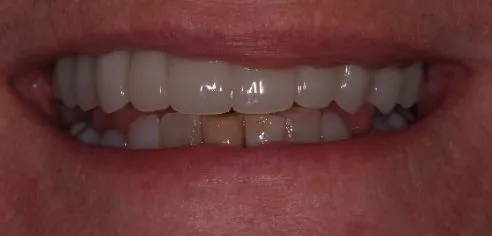Dental implants
Long term replacements for missing teeth.
Edited by Gurmandeep Sond, Former Clinical Development Manager at Bupa Dental Care, October 2024
Next review due October 2029
Dental implants are a long term solution for missing teeth.
You may want to replace missing teeth if you:
Dental implants look and function like your natural teeth. With proper care and attention they can last for several years.
With a dental implant, a titanium screw is placed into your jawbone, replacing your missing tooth root.
After it s fitted, the bone fuses to the implant, holding it in place.
A false tooth which matches your other teeth is fitted to the top of the implant.
Dental implants can be uncomfortable, but we offer different options for pain relief when getting them fitted.
What are the benefits of dental implants?
Dental implants can help with issues caused by missing teeth. These include loss of bone density and your remaining teeth moving due to lack of support.
Who are dental implants suitable for?
They can be suitable for adults of all ages, but aren't recommended for those under 18.
1. We'll talk you through your options
Get in touch and we'll explain what options are available. We'll work out the right treatment for you.
2. Clinical assessment
We'll check to see whether you're suitable for implants, and if they're the right solution for you..
3. Placing your implant
We'll place your implant at your local practice. It's straightforward and usually done under local anaesthetic.
4. Fitting your replacement teeth
Once your implant has healed, your replacement tooth or teeth can be fitted.
5. Aftercare
During and after the treatment, we'll give you all the aftercare advice you need to help you look after your implants.
Implants from £2,400†
Our bespoke dental implants are a longterm solution to missing teeth. Treatment starts from £2,400†.
Finance is available to help spread the cost of treatment.
Spread the cost of your dental implants**
If you re worried about the cost of dental implants, you can spread the cost of your treatment over 12 , 18 or 24 months.
No insurance needed
Our services are available to all eligible patients. You don't need Bupa insurance for dental implants.
Insurance customers may access extra benefits.
Worried about dental implants?
If you're nervous or anxious about getting treatment, or have questions about what to expect, you can speak to our implant enquiry coordinators on 01454 771490.
Lines are open Monday to Friday, from 9am to 5pm. We may record or monitor calls.
You can also get in touch by filling in our contact form. Our team will be happy to answer any questions you might have.
Siobhan's implant journey
Siobhan had the smile in a day treatment. Her dentist, Peter Sanders, fitted her full upper arch of teeth in a single appointment.
Speaking about her treatment, Siobhan said:
“I would often hide my smile with closed lips or laugh with my hand in front of my face. Suddenly I didn’t need to, and so this was a massive confidence boost for me.”
 Before
Before
 After
After
What should I do if I'm interested in dental implants?
You can call us on 01454 771490 for a free consultation, or book online by finding your nearest Bupa Dental Care practice offering implants.
*Lines are open Mon to Fri, from 9am to 5pm. We may record or monitor calls.
Why choose Bupa Dental Care?
- Implants from £2,400
- More than 350 practices across the UK and Ireland
- A network of over 2,500 trusted professionals
- Personalised treatment with clear pricing
- Bupa Dental Care is the UK s leading provider of private dentistry2
- Experience up to date modern technology
- A comprehensive range of implant solutions
Dental implant enquiry form
If you're interested in dental implants, please complete the enquiry form and we'll be in touch.
† 1. £2,400 price point includes the cost of a single implant, abutment and screw retained porcelain crown. 2. Prices and options may vary depending on location and suitability. 3. Starting prices available on request at your local practice. 4. Patients must be aged 18 or over.
*1. Free initial consultations are to discuss options and suitability for treatment. Subsequent clinical examinations and diagnostic tests required, and any associated costs will be discussed prior to treatment commencing. 2. Consultations subject to availability.
**Finance applicant must be aged 18 or over, a UK resident, have a UK bank account and be in permanent employment. All loans are subject to eligibility, status, affordability and a credit check. T&Cs apply. Finance is available on private dental treatments only.
The minimum spend for finance is £250 and the maximum is £50,000. 0% APR representative is available on repayment terms of up to 36 months subject to the amount of credit. Finance taken at repayment terms of 48 or 60 months is subject to 7.9% APR representative.
Bupa Dental Care is a trading name of Oasis Dental Care Limited, Vantage Office Park, Bristol, BS16 1GW, whose company registered number is 00478127. Oasis Dental Care Limited is authorised and regulated by the Financial Conduct Authority FCA registration number 710559. Oasis Dental Care Limited is a credit broker and not a lender.
Finance is provided by Novuna Personal Finance, a trading style of Mitsubishi HC Capital UK PLC, authorised and regulated by the Financial Conduct Authority. Financial Services Register no. 704348. Registered Office: Novuna House, Thorpe Road, Staines-upon-Thames, Surrey, TW18 3HP. Registered in Cardiff under company no. 1630491. The register can be accessed through www.fca.org.uk.
1. LaingBuisson, Dentistry UK Market Report, 5th ed. If you require verification, please email [email protected]
2 Source: LaingBuisson, Dentistry UK Market Report, 5th ed.
Bupa Dental Care is a trading name of Oasis Dental Care Limited. Registered in England and Wales No: 00478127. Registered office: Bupa Dental Care, Vantage Office Park, Old Gloucester Road, Hambrook, Bristol, United Kingdom BS16 1GW.
Oasis Dental Care Limited has a number of trading names including Bupa Dental Care. For a list of all our different trading names please follow this link.






